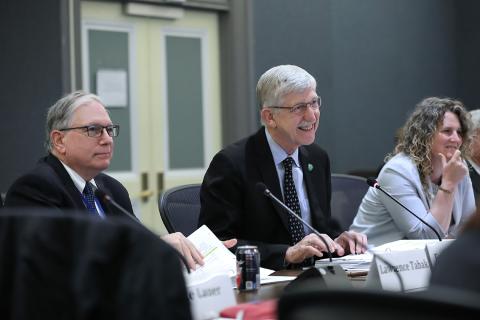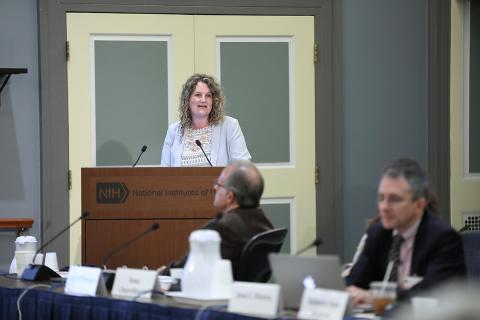118th ACD Tackles Range of Major Issues

Photo: Chia-Chi Charlie Chang
Someone ought to do the math sometime on how a 1½-day gathering of the advisory committee to the NIH director (ACD) manages to include so many topics of lasting significance into so short a space—chromosomes packed into the nucleus have nothing on this group.
The 118th ACD on June 13-14 included updates from the working group on diversity, which for the first time reported real progress in increasing inclusiveness of the scientific workforce. The BRAIN Initiative working group 2.0 proposed what NIH director Dr. Francis Collins called an inspiring set of goals for the next 5 years. And artificial intelligence, already entwined into our lives in everything from banking, to navigation, to Facebook, is poised to make even more significant contributions to biomedical science.
Reaching into the headlines, the committee also dealt with such thorny issues as the need to change the workplace culture around sexual harassment and concerns about foreign influence in biomedical research.
“It has been an intense 6 months since we last met,” Collins admitted at the outset.
‘Show Me the Data’
The artificial intelligence working group, established last December, urges pursuit of five themes: more AI-ready data (including cataloging existing sets); more multilingual researchers (those fluent in both biology and computer science); an ELSI (ethical, legal and social implications) component, such as helped guide the Human Genome Project; and identification of areas to apply and advance AI.

Photo: Chia-Chi Charlie Chang
“There are ways to get it wrong,” cautioned Dr. David Glazer, engineering director at Verily and chair of the working group. “There are side effects we don’t want.” He noted that some data sets are “almost really valuable” and warned that “machine learning can give an aura of legitimacy to inherent bias, as in ‘But the computer says…’”
“AI is not a replacement [for people], but an empowerment,” added Dr. Dina Katabi, an AI researcher at MIT, who endorses a team approach.
Some Headway in Diversity
Big data was the great ally of Dr. Hannah Valantine, co-chair of the ACD working group on diversity in the biomedical research workforce, who showed graphically that more minorities are applying for and winning NIH funding.
“Has anything changed? Are we seeing any progress? I think so,” she told the group. “It’s not perfect but some headway is being made.”
By a variety of measures, members of groups traditionally underrepresented in research were doing demonstrably better as degree recipients, faculty members and NIH grantees in 2018 than in 2012, which was before NIH introduced a range of interventions to narrow the gap.
Valantine briefly described the new NIH Distinguished Scholars Program, a cohort to be based within the Intramural Research Program that aims to build a self-reinforcing community of principal investigators.
“There’s still way, way, way more to do,” said Dr. M. Roy Wilson, Valantine’s co-chair and president of Wayne State University. “Black males are still stubbornly rare in science.”
Impressive at Halfway Mark
The ACD also heard a major report about the future of the Brain Research through Advancing Innovative Neurotechnologies (BRAIN) Initiative. Dr. John Maunsell of the University of Chicago and his co-chair of the BRAIN Initiative working group 2.0, Dr. Catherine Dulac of Harvard, urged NIH to “stay on the productive path already underway…continuing support for technology development and targeted study of circuit components.”
Their group called for added emphasis on behavior paradigms, an encouragement to balance investigator-initiated research with team science and an emphasis on large-scale transformative projects.

Photo: Chia-Chi Charlie Chang
Drs. Jeffrey Kahn of Johns Hopkins University and Jim Eberwine of the University of Pennsylvania, co-chairs of the BRAIN neuroethics subgroup, also presented the results of their deliberations.
“Although brain research entails ethical issues that are common to other areas of biomedical science, it entails special ethical considerations,” they argued. “Because the brain gives rise to consciousness, our innermost thoughts and our most basic human needs, mechanistic studies of the brain have already resulted in new social and ethical questions.” Therefore, they called for establishment of a Neuroethics Roadmap for the BRAIN Initiative.
The presentations resonated with members of the ACD, but they want to see further integration of the two reports. After a lengthy discussion of the issue, Collins indicated that a merged report would be developed and shared with the ACD by teleconference within the next month.
Addressing Workplace Harassment
The ACD heard an interim report on NIH’s workplace climate assessment survey of harassment, which found that 21.6 percent of the workforce experienced some form of harassment in the past year.
“This is a vexing and unacceptable situation,” said Collins, who said NIH will begin addressing the problem immediately, without waiting for the ACD working group on sexual harassment to present its final report in December. “We are sorry for the way we did not respond adequately in the past.”
“Human behavior, as we all know, is tremendously difficult to change,” said Dr. Carrie Wolinetz, director of the Office of Science Policy and acting chief of staff. “This issue gets into uncomfortable space in each of us…It is time for us to be part of the solution and to apologize to women affected by sexual harassment.”
She said a new web-based portal for confidentially reporting episodes of sexual harassment will soon debut, acknowledging that a reluctance to report harassment is “a major issue, due to fears of reprisal, or of not being believed.”
“Many men have no idea of what sexual harassment is, even right now,” observed new ACD member Dr. Shelley Berger, professor of cell and developmental biology at the University of Pennsylvania.

Photo: Chia-Chi Charlie Chang
Collins earned a spontaneous round of applause when he announced his intention not to participate in men-only panels, or “manels,” anymore.
“I have sat on too many panels and participated in too many meetings in the past 5 years…that have been populated largely by white males,” he said, acknowledging that his decision grew out of recently publicized concerns about the unsettling prevalence of sexual harassment in science and engineering. “I’m not going to do that anymore…This is something I hope others might notice.”
He then reported that the ACD recently welcomed seven new members, all of them women, a likely first in ACD history.
Outbreaks of Ebola, Measles
Updating the group on the outbreak of Ebola in Africa and of measles in the United States, NIAID director Dr. Anthony Fauci underscored troubling developments: In the Democratic Republic of Congo, where more than 1,400 people have died during an uptick in the most recent Ebola crisis, caregivers themselves are under violent attack in some areas.
And in Brooklyn, where there have been more than 560 cases of measles, there are rallies where people are being encouraged not to use proven measles vaccines, despite overwhelming evidence that they are safe and effective.
“This is libertarianism taken to the extreme,” said Fauci, who seemed baffled by citizens who are unwilling to accept any civil or medical authority. “Anti-vaxers say [measles] is a trivial disease, but nothing could be further from the truth.” Measles is one of the most contagious viruses known to man, Fauci noted. On average about one in 1,000 infected children will die.
“It’s a tragedy not to vaccinate children,” said Fauci. “We are now going backwards” since 2000, he said, when measles was eliminated in the U.S. “This is the worst we’ve seen in 25 years…It is now coming back with a vengeance.” Total cases stood at 1,022 in early June.
“This is an outbreak we never should have had,” said Collins, noting that he was home-schooled in the pre-vaccination era and missed childhood illnesses. Then he was hospitalized with measles at age 29. “I was a pretty sick cookie.”
Foreign Influence on Research Integrity
As the final agenda item, the ACD heard from NIH leadership about a vexing problem facing the agency—inappropriate actions of certain grantees hailing from overseas.

Photo: Chia-Chi Charlie Chang
“We have to acknowledge the extraordinary contributions of foreign scientists, over and over again,” cautioned Dr. Lawrence Tabak, NIH principal deputy director, “but there is a small number of people doing some incredibly egregious things. This is calculated theft. This is calculated dishonesty that ends up cheating everybody.”
“What we’re talking about is a relatively small group of people…who are engaging in some serious acts of misconduct,” said Dr. Michael Lauer, NIH deputy director for extramural research.
NIH has reached out to more than 60 institutions, he said, where it has found cases of failure to disclose substantial foreign resources and foreign financial conflicts of interest, on top of serious peer-review violations.
“This is about absence of transparency,” said Lauer. “This is about absence of disclosure.”
U.S. institutions think they are paying for 12 months of effort from some investigators who are also working simultaneously for foreign entities.
“As one dean told me, essentially what’s going on here is time-theft,” said Lauer. “We’ve seen 15-16 months of obligations reported for a single year. We’ve seen start-up companies and equity in companies that have not been disclosed at all. Patents have been applied for that no one knows anything about.”

Photo: Chia-Chi Charlie Chang
The result, Lauer said, is duplicative and wasteful NIH spending. “Our funding decisions are distorted as a consequence of that…We’ve been told some rather blatant lies.”
NIH is working closely with the FBI, other federal agencies and scientific societies and associations as part of a broad awareness campaign, said Lauer, who noted that NIH has referred 18 scientists to the HHS Office of the Inspector General for further review, due to an absence of transparency and disclosure.
Universities, too, are involved, with Penn State providing a notably strong example of an effective institutional response, Lauer said.
“The problem is not international work—it’s not telling [the funding institution] about it,” said Lauer. “We reiterate the importance of the contributions of foreign scientists to biomedical research. We must not create a climate that is unwelcoming to them.”
To view the ACD webcast and all meeting-related materials, visit https://acd.od.nih.gov/meetings.html.
